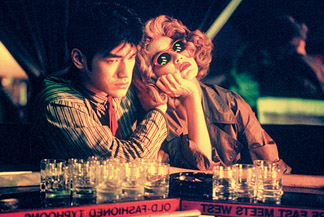Classic Movie Review: Chungking Express
By Edwin Davies
November 5, 2012
Chungking Express is, for my money, unquestionably a masterpiece, but one of the most delightful things about it is that it's something of an accidental masterpiece. The film was conceived as a distraction for director Wong Kar-Wai, who at the time was embroiled in the editing of another film, Ashes of Time. The latter was a big-budget historical epic that he was struggling to shape in the editing room, so he took a break for a couple of months and made a small, scrappy contemporary film as a way of working through whatever creative issues he was dealing with at the time. Once Chungking Express was completed, he was able to return to Ashes of Time with renewed vigour and energy. In the process he had somehow made not only his best film, but also one of the best films of the 1990s, without even meaning to. It's probably the best argument in favour of procrastination in the history of art.
The on-the-fly scrappiness of Chungking Express's production bleeds into its story, or more accurately its stories, which have a vibrant unpredictability that suggests they were being written as they went along. Set in Hong Kong, the film is split into two separate, slightly unequal halves, both of which revolve around the love lives of lonely policemen. The first story follows He Qiwu, a.k.a. Cop 223 (Takeshi Kaneshiro), a man who has recently become obsessed with the impermanence of things. Having broken up with his girlfriend on April Fool's Day, he hopes that their break-up must on some level be a joke, and he decides to let the gag last for a month; if May (the month) comes and May (his ex-girlfriend) doesn't come back to him, then he'll know it's truly over. During this time he falls into a routine of buying cans of pineapple, all of which are due to expire on the 1st of May, for reasons which may only make sense in his lovesick mind. On the first of May, he meets and falls in love with a mysterious woman (Brigitte Lin) who, unbeknownst to him, is part of a drug smuggling operation and is on the run from her partners.
The second - and longer - story centres around Cop 663 (Tony Leung), who is also dealing with the aftermath of a break-up. He befriends and becomes the object of affection for Faye (Faye Wong), the whimsical waif who works behind the counter of the snack bar he frequents. The two bond over music - she loves anything that's loud; he claims to not know anything about music - and food, or rather she berates him for drinking too much black coffee. Nevertheless, there is something between them, and when Faye gets a hold of a key to Cop 663's apartment, she starts making clandestine visits to his home, tidying up the place and secretly improving it for him. It's just the right side of stalkerish to be endearing.
Though the two stories play out different and have wildly contrasting tones - the first is closer in style to As Tears Go By, the frenetic gangster film that was Wong's directorial debut; the second is much less heightened, though no less vibrant - they nicely complement each other as tales of people making brief, yet profound connections amongst the thrum of a big city. Almost every character in Chungking Express is lonely. Both Cop 223 and Cop 663 are obviously smarting from their recently ended relationships, whilst Faye's effervescence seems to mask a lack of connections with any real substance to them. The irony of the film is that even though the characters all live in a densely packed city that is so bustling and active, they all lack some basic human connection in their lives, be it love or friendship.
Continued:
1
2




